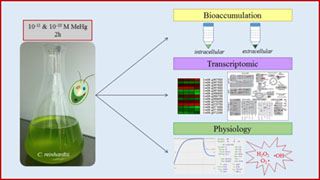Publication in "Environmental Science & Technology."
Transcriptomic and Physiological Responses of the Green Microalga Chlamydomonas reinhardtii during Short-Term Exposure to Subnanomolar Methylmercury Concentrations

The effects of short-term exposure to subnanomolar methyl-mercury (MeHg) concentrations, representative of contaminated environments, on the microalga Chlamydomonas reinhardtii were assessed using both physiological end points and gene expression analysis. MeHg bioaccumulated and induced significant increase of the photosynthesis efficiency, while the algal growth, oxidative stress, and chlorophyll fluorescence were unaffected. At the molecular level, MeHg significantly dysregulated the expression of genes involved in motility, energy metabolism, lipid metabolism, metal transport, and antioxidant enzymes. Data suggest that the cells were able to cope with subnanomolar MeHg exposure, but this tolerance resulted in a significant cost to the cell energy and reserve metabolism as well as ample changes in the nutrition and motility of C. reinhardtii. The present results allowed gaining new insights on the effects and uptake mechanisms of MeHg at subnanomolar concentrations in aquatic primary producers.
BEAUVAIS-FLUECK, Rebecca, SLAVEYKOVA, Vera, COSIO, Claudia. Transcriptomic and Physiological Responses of the Green Microalga Chlamydomonas reinhardtii during Short-Term Exposure to Subnanomolar Methylmercury Concentrations. Environmental, Science & Technology, 2016.
29 Jun 2016